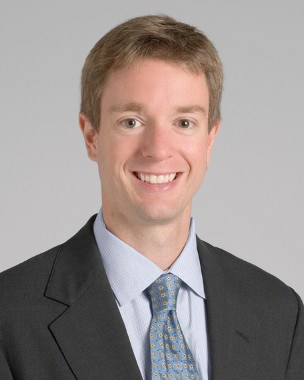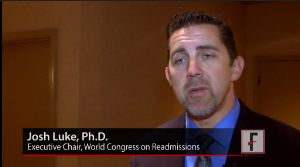User login
World Health Care Congress: Leadership Summit on Hospital Re-Admissions
Despite barriers, telehealth growing rapidly
ORLANDO – Telehealth has been around for decades, but only recently, it has begun to gain momentum, as a result of advancements in technology. Yet, there are still barriers to overcome.
At the World Congress Leadership Summit on Hospital Readmissions, we spoke with the Cleveland Clinic’s Dr. William Morris and other leaders in the field to find out how they assessed current state of telehealth and its future potential.
On Twitter @naseemmiller
The video associated with this article is no longer available on this site. Please view all of our videos on the MDedge YouTube channel
ORLANDO – Telehealth has been around for decades, but only recently, it has begun to gain momentum, as a result of advancements in technology. Yet, there are still barriers to overcome.
At the World Congress Leadership Summit on Hospital Readmissions, we spoke with the Cleveland Clinic’s Dr. William Morris and other leaders in the field to find out how they assessed current state of telehealth and its future potential.
On Twitter @naseemmiller
The video associated with this article is no longer available on this site. Please view all of our videos on the MDedge YouTube channel
ORLANDO – Telehealth has been around for decades, but only recently, it has begun to gain momentum, as a result of advancements in technology. Yet, there are still barriers to overcome.
At the World Congress Leadership Summit on Hospital Readmissions, we spoke with the Cleveland Clinic’s Dr. William Morris and other leaders in the field to find out how they assessed current state of telehealth and its future potential.
On Twitter @naseemmiller
The video associated with this article is no longer available on this site. Please view all of our videos on the MDedge YouTube channel
AT THE HOSPITAL READMISSIONS SUMMIT
Florida ACO shares secrets to success
ORLANDO – Primary Partners, a Clermont, Fla.–based Accountable Care Organization, is among 27 ACOs in the federal government’s shared savings program. The ACO collaborates with five hospitals in four Florida counties and includes more than 60 physicians.
At the recent World Congress Leadership Summit on Hospital Readmissions, the ACO’s CEO, a participating physician, and the CEO of a collaborating hospital share what they've learned in the process, and what advice they'd give to hospitalists and physicians who are part of an ACO or considering joining one.
On Twitter @naseemmiller
ORLANDO – Primary Partners, a Clermont, Fla.–based Accountable Care Organization, is among 27 ACOs in the federal government’s shared savings program. The ACO collaborates with five hospitals in four Florida counties and includes more than 60 physicians.
At the recent World Congress Leadership Summit on Hospital Readmissions, the ACO’s CEO, a participating physician, and the CEO of a collaborating hospital share what they've learned in the process, and what advice they'd give to hospitalists and physicians who are part of an ACO or considering joining one.
On Twitter @naseemmiller
ORLANDO – Primary Partners, a Clermont, Fla.–based Accountable Care Organization, is among 27 ACOs in the federal government’s shared savings program. The ACO collaborates with five hospitals in four Florida counties and includes more than 60 physicians.
At the recent World Congress Leadership Summit on Hospital Readmissions, the ACO’s CEO, a participating physician, and the CEO of a collaborating hospital share what they've learned in the process, and what advice they'd give to hospitalists and physicians who are part of an ACO or considering joining one.
On Twitter @naseemmiller
AT THE HOSPITAL READMISSION SUMMIT
VIDEO: Website collects best practices for reducing readmissions
ORLANDO – Under the Affordable Care Act, hospitals are financially penalized for having higher than average readmission rates for certain conditions. Since the law’s 2010 enactment, hospital leaders have been working to reduce readmission rates.
At the World Congress Leadership Summit on Hospital Readmissions, Josh Luke, Ph.D., said that communication and technology are key elements of reducing readmissions, but implementing effective protocols is also site specific.
To collect best practices in hospitals across the nation, Dr. Luke, who was the meeting’s chair, has created the National Readmission Prevention Collaborative website. Accessing the information is free, and Dr. Luke encouraged others to submit their success stories.
Dr. Luke is the vice president of post acute services at Torrance (Calif.) Memorial Medical Center, and he shared his thoughts and ideas on reducing readmissions during a video interview at the meeting.
The video associated with this article is no longer available on this site. Please view all of our videos on the MDedge YouTube channel
On Twitter @naseemsmiller
ORLANDO – Under the Affordable Care Act, hospitals are financially penalized for having higher than average readmission rates for certain conditions. Since the law’s 2010 enactment, hospital leaders have been working to reduce readmission rates.
At the World Congress Leadership Summit on Hospital Readmissions, Josh Luke, Ph.D., said that communication and technology are key elements of reducing readmissions, but implementing effective protocols is also site specific.
To collect best practices in hospitals across the nation, Dr. Luke, who was the meeting’s chair, has created the National Readmission Prevention Collaborative website. Accessing the information is free, and Dr. Luke encouraged others to submit their success stories.
Dr. Luke is the vice president of post acute services at Torrance (Calif.) Memorial Medical Center, and he shared his thoughts and ideas on reducing readmissions during a video interview at the meeting.
The video associated with this article is no longer available on this site. Please view all of our videos on the MDedge YouTube channel
On Twitter @naseemsmiller
ORLANDO – Under the Affordable Care Act, hospitals are financially penalized for having higher than average readmission rates for certain conditions. Since the law’s 2010 enactment, hospital leaders have been working to reduce readmission rates.
At the World Congress Leadership Summit on Hospital Readmissions, Josh Luke, Ph.D., said that communication and technology are key elements of reducing readmissions, but implementing effective protocols is also site specific.
To collect best practices in hospitals across the nation, Dr. Luke, who was the meeting’s chair, has created the National Readmission Prevention Collaborative website. Accessing the information is free, and Dr. Luke encouraged others to submit their success stories.
Dr. Luke is the vice president of post acute services at Torrance (Calif.) Memorial Medical Center, and he shared his thoughts and ideas on reducing readmissions during a video interview at the meeting.
The video associated with this article is no longer available on this site. Please view all of our videos on the MDedge YouTube channel
On Twitter @naseemsmiller
ANALYSIS FROM THE HOSPITAL READMISSIONS SUMMIT
VIDEO: Bionic exoskeleton helps paralyzed patients walk
ORLANDO – It’s a bionic suit, a battery-powered exoskeleton, or as Chris Tagatac calls it, a wearable robot.
Mr. Tagatac, who is paralyzed from the lower ribs down, demonstrated the computer- and battery-operated Ekso Bionics suit at the annual meeting of the Healthcare Information and Management Systems Society, and he spoke with us about his experience. Watch the video to learn more about him and the technology.
The video associated with this article is no longer available on this site. Please view all of our videos on the MDedge YouTube channel
On Twitter @aliciaault
On Twitter @naseemsmiller
ORLANDO – It’s a bionic suit, a battery-powered exoskeleton, or as Chris Tagatac calls it, a wearable robot.
Mr. Tagatac, who is paralyzed from the lower ribs down, demonstrated the computer- and battery-operated Ekso Bionics suit at the annual meeting of the Healthcare Information and Management Systems Society, and he spoke with us about his experience. Watch the video to learn more about him and the technology.
The video associated with this article is no longer available on this site. Please view all of our videos on the MDedge YouTube channel
On Twitter @aliciaault
On Twitter @naseemsmiller
ORLANDO – It’s a bionic suit, a battery-powered exoskeleton, or as Chris Tagatac calls it, a wearable robot.
Mr. Tagatac, who is paralyzed from the lower ribs down, demonstrated the computer- and battery-operated Ekso Bionics suit at the annual meeting of the Healthcare Information and Management Systems Society, and he spoke with us about his experience. Watch the video to learn more about him and the technology.
The video associated with this article is no longer available on this site. Please view all of our videos on the MDedge YouTube channel
On Twitter @aliciaault
On Twitter @naseemsmiller
AT HIMSS14


